
Predict the winner!!!!
The requirements for a data analyst can vary depending on the industry and specific job role, but generally, they include the following:
Educational Background:
Degree: A bachelor's degree in a related field such as Computer Science, Statistics, Mathematics, Economics, or Data Science. A master's degree can be beneficial for more advanced roles.
Certifications: Professional certifications in data analysis, such as those offered by Microsoft, IBM, or Google, can add value.
Technical Skills:Statistical Analysis:
Strong understanding of statistical methods and their application.
Programming Languages: Proficiency in programming languages commonly used in data analysis, such as Python, R, or SQL.
Data Visualization Tools: Experience with tools like Tableau, Power BI, or D3.js for creating visual representations of data.
Database Management: Knowledge of database systems (e.g., SQL, NoSQL) and data warehousing solutions.
Big Data Technologies: Familiarity with big data frameworks and tools like Hadoop, Spark, or Kafka can be advantageous.
Machine Learning: Understanding of machine learning algorithms and their applications is beneficial for more advanced analysis.
Analytical Skills:
Problem-Solving: Ability to identify patterns, trends, and insights from complex data sets.
Critical Thinking: Capability to think critically and question assumptions to derive meaningful conclusions.
Attention to Detail: Precision and accuracy in handling data and performing analyses.
Soft Skills:
Communication: Ability to communicate complex findings in a clear and concise manner to non-technical stakeholders.
Collaboration: Strong teamwork skills to work effectively with other departments such as IT, marketing, and finance.
Time Management: Efficient time management and organizational skills to handle multiple projects simultaneously.
Experience:
Relevant Work Experience: Experience in a similar role or in a data-intensive environment. Internships or co-op positions can also be valuable.
Project Experience: Practical experience with data analysis projects, which can be demonstrated through previous work, academic projects, or personal projects.
Tools and Software:
Data Analysis Software: Proficiency with software such as Excel, SAS, or SPSS.
Version Control: Knowledge of version control systems like Git.Cloud Platforms: Experience with cloud services (AWS, Azure, Google Cloud) for data storage and processing can be a plus.
Continual Learning:
Staying Updated: Commitment to staying updated with the latest industry trends, tools, and technologies through continuous learning and professional development.These requirements can be tailored to fit specific job descriptions, but having a solid foundation in these areas will prepare you well for a career as a data analyst.
You're more than welcome to post your sports posts in our new "The World of Sports" community--> https://steemit.com/trending/hive-199189
Downvoting a post can decrease pending rewards and make it less visible. Common reasons:
Submit
Thank you so much!
I’m excited to be a part of 'The World of Sports' community and share my passion for sports.
Looking forward to contributing and engaging with everyone!"
Downvoting a post can decrease pending rewards and make it less visible. Common reasons:
Submit